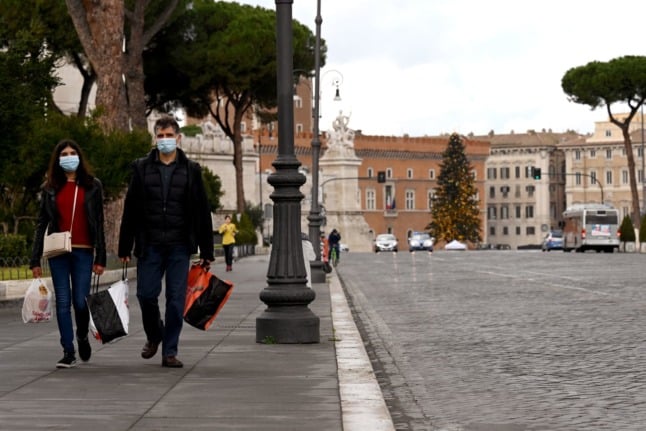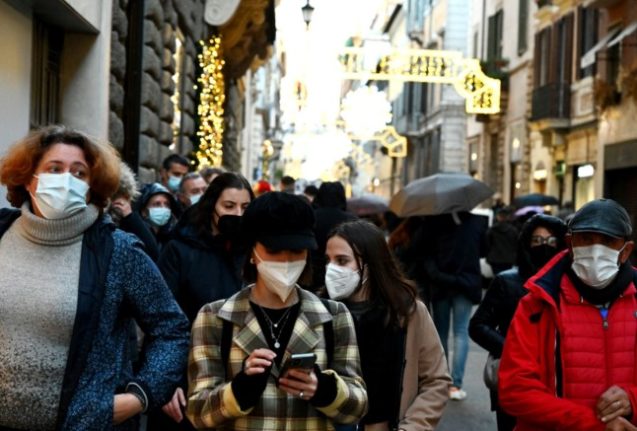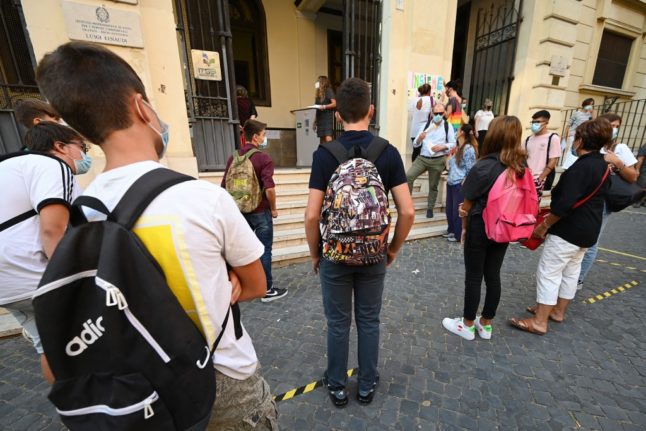Life in Italy changes on Monday as the government brings in new Covid restrictions.
From Monday, a ‘super green pass’ (a term coined by Italy’s news media; the government uses the more sober but less snappy term ‘reinforced green pass’) will be required to access many public spaces.
This supersedes the basic Italian ‘green pass’, or Covid health certificate, which can be obtained either through vaccination and recovery from Covid or by having tested negative for the virus in the preceding two to three days (depending on the type of test taken).
READ ALSO: Q&A: How will Italy’s new Covid ‘super green pass’ work?
The ‘super green pass’, by contrast, can only be obtained through vaccination or recovery from Covid – not via a negative test result.
For those who already have an Italian green pass due to being vaccinated against or recovered from Covid, the changes will be minimal.
The government hasn’t indicated that vaccinated or Covid-recovered green pass holders need to do anything to upgrade their pass – so it appears as though their certificates will automatically be considered a ‘super green pass’, and users can go on as before.
Those without such a health certificate will now need to get vaccinated to obtain the ‘super green pass’ if they want to avoid losing access to a range of venues and services across the country.

While most activities will now require a ‘super green pass’, the basic green pass – that is, one obtained via a negative test result – will be valid in some situations that from Monday require a health certificate for the first time (having previously not required any kind of pass). These are:
- Local public transport services
- Hotels
READ ALSO: How do Italy’s new Covidgreen pass rules affect tourists?
A basic green pass has been required to access long-distance domestic public transport for several months now; from Monday, this is extended to local public transport, including buses, trains, and metro carriages.
On Sunday, the government updated its guidance to clarify which rules relating to the basic green pass and ‘super green pass’ will apply in which zones.
Italy operates under a four-tier colour coded system for coronavirus restrictions, with ‘white’ zone areas under the most relaxed rules, and ‘yellow’, ‘orange’ and ‘red’ zones under increasingly strict measures.
As of Monday, the autonomous province of Bolzano and Friuli Venezia Giulia are in the more restricted ‘yellow’ zone, as both regions have exceeded the government’s hospital occupancy and Covid infection rate thresholds.
The rest of the country remains for now in the least restricted ‘white’ zone, although several others regions are expected to enter the yellow zone in the coming weeks as their infection rates climb.
READ ALSO: How to get a Covid-19 vaccine booster shot in Italy
With the green pass and ‘super green pass’ in place, activities will continue to go ahead in white, yellow and orange zones, with slightly different rules applying in each zone. The red zone indicates a near-total shut down, with no leisure activities allowed.
Here are the government’s updated rules regarding green pass requirements for different venues and services across different zones:
Bars and restaurants
- Indoor dining allowed only for ‘super green pass’ holders in white, yellow and orange zones.
- Dining outdoors at restaurants or standing at the bar does not require any kind of pass in white and yellow zones only. In orange zones, these activities require a ‘super green pass’.
Hotels
- Can be accessed via a basic green pass in white, yellow and orange zones.
- Dining at the hotel where the restaurant is reserved for hotel guests only requires a basic green pass across all zones.
- Indoor dining at the hotel where the restaurant is open to non-guests requires a ‘super green pass’ across all zones.
- Outdoor dining at the hotel where the restaurant is open to non-guests does not require any kind of pass in white and yellow zones. In orange zones, a ‘super green pass’ is required.
Public transport (local and long-distance)
- Can be accessed via a basic green pass in white, yellow and orange zones.
- Taxis and private driver rentals for vehicles that have up to nine seats do not require any kind of pass in any zone.
- School buses carrying children under the age of 12 do not require any kind of pass in any zone.
Shops
- No pass of any kind is required in white, yellow or orange zones to access shops that are not in malls or shopping centres.
- For shops in malls or shopping centres, no pass is required at any time in white and yellow zones.
- In orange zones, no pass is required Monday-Friday to enter shops in malls or shopping centres, but a ‘super green pass’ is required on weekends and on public holidays and the days directly preceding them. However, food stores, pharmacies, tobacconists, news stands, and book shops are all exempt; no pass is required for these spaces under any circumstances.
Theatres, cinemas, concerts
- A ‘super green pass’ is required across all zones for all indoor activities in this category.
Museums, exhibitions, cultural sites
- A basic green pass is required to access indoor spaces in the white and yellow zones; a ‘super green pass’ is required in the orange zone.
Dance clubs
- A ‘super green pass’ is required across all zones.
Sports activities
- A basic green pass is valid to access indoor gyms, swimming pools, and other sports facilities in white and yellow zones. In orange zones, a ‘super green pass’ is required.
- No pass of any kind is required to access open air sports facilities in white and yellow zones. In orange zones, the ‘super green pass’ is required.
- To enter changing rooms in sports facilities, a basic green pass is required in white and yellow zones; a ‘super green pass’ is required in orange zones.
Spectator sports events and matches
- A ‘super green pass’ is required across all zones.
Ski slopes
- Can be accessed via a basic green pass in white and yellow zones. In orange zones, the ‘super green pass’ is required.
Spas and thermal baths
- A basic green pass is required to access spas and indoor or open air thermal baths in white and yellow zones; a ‘super green pass’ is required in orange zones.
Cultural and social centres, betting halls, casinos
- Whether indoors or outdoors, a basic green pass is required in the white and yellow zones, and a ‘super green pass’ in the orange zone.
Schools and universities
- No pass is required for school students and students of technical institutes.
- A basic green pass is required in all zones for university students.
Workplaces
- A basic green pass is required to access the workplace in all cases, except for those workers subject to a vaccine mandate.
Across all zones, the basic green pass is valid for visitor access to care homes.
As under the current rules, Italy’s ‘super green pass’ requirement will apply to everyone in the country, including non-Italian tourists.
Foreign tourists with vaccination cards or certificates from Canada, Israel, Japan, the United Kingdom (including England, Scotland, Wales, Northern Ireland, Gibraltar, the Isle of Man, the Channel Islands and British military bases on Cyprus), and the United States of America will be able to continue using these in place of the ‘super green pass’, provided they show the holder has completed a full initial vaccination cycle for at least 14 days.
The new rules will remain in place until at least January 15th.
Please note that The Local cannot advise on individual cases. For further details about Italy’s current Covid-19 health measures please see the Italian Health Ministry’s website (available in English).



 Please whitelist us to continue reading.
Please whitelist us to continue reading.
Asking for a friend: I am a US citizen currently attending a Masters course at the University of Pavia in the Lombardy region. In the US, I was fully vaccinated as of April 5th, 2021. Therefore, my “super green pass” will expire on January 5th, 2022. As of right now, the Lombardy region is only offering third dose booster shots to Italian citizens and as a result, I do not qualify to receive one. This is concerning to me as my vaccination will soon expire. Does anyone know of any regions that are offering third dose vaccinations to US citizens? I am willing to travel to any region!
I found this link: https://www.yesmilano.it/en/articles/latest-administrative-updates
Basically, it seems that students are able to get a booster. You need to have a Codice Fiscale and an Italian mobile phone number, which I assume you have.
Good luck!
Thank you SP!
Though the autonomous provinces of Trento and Bolzano constitute one region, throughout the pandemic, their zone colors have been set separately. Indeed, on Monday, 6 December, only Bolzano (i.e. Alto Adige) will turn yellow, not Trento (i.e. Trentino), according to local and national news, as well as the ministry of health site.
I see the story has been changed to reflect this, making this comment seem apropos of nothing. But thanks for correcting it.
I will be in Sicilia from Feb, 17 to Feb 25. I am a U.S. Citizen who is fully vaccinated and boosted (Pfizer ).
IS this equal to the Green Pass
Thank you,
Joe Zarba